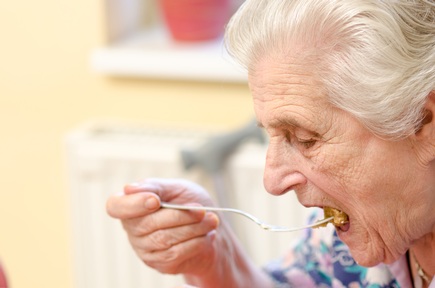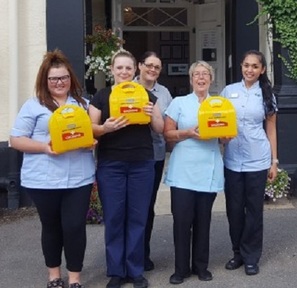Care homes urged to reduce choking deaths
Care homes are being urged to keep up to date with care plans and ensure staff are given specialist training in order to reduce choking deaths.

Data from the Office of National Statistics (ONS) reveals that in 2017, 60 residents died directly from choking-related incidents in care homes. In 2016, 60 residents also died from choking, while in 2015, the rate was 62 and in 2014, 53.
Over the last few years, care home residents have died after choking on food such as chicken nuggets, dough balls, a sandwich, a piece of bread and a segment of orange.
Up to 75 per cent of care home residents have dysphagia, which means they find it difficult to swallow, eat or drink.
'Care homes need a proper choking procedure'
Judy Downey, chair of the Relatives & Residents Association (R&RA) believes choking in care homes is a "serious and often overlooked risk". She would like to see all care home residents receiving "an assessment from a specialist" and says: "It is essential that care home staff have the time and training to be able to meet these needs."
Ms Downey adds: “Unfortunately, we regularly hear accounts of vulnerable residents being placed in danger as a result of poor understanding of their needs.
"One caller to our helpline complained that her mother had been given a nut roast which she could not eat due to swallowing difficulties and the danger of nuts becoming stuck in her throat.
“Relatives and friends need to know that the resident’s care plan should usually include any needs to do with swallowing, eating and drinking, and all staff must be made aware of these and receive the training and supervision to ensure that the risk of choking is minimised."
According to the Royal College of Speech and Language Therapists, 68 per cent of people with dementia in care homes and 33 per cent of people with Multiple Sclerosis have dysphagia.
Sue Pownall, head of speech and language therapy and clinical lead in dysphagia at Sheffield Teaching Hospitals NHS Foundation Trust would like to see more awareness of the difficulties faced by residents who have dysphagia, saying: "Care home staff should be trained to support residents to eat and drink safely and to minimise the risks of choking.
"The Inter-professional Dysphagia Framework (IDF) sets out the knowledge and skills care staff require to do this.The IDF should be implemented in every care home to ensure residents receive safe and effective care."
Kamini Gadhok, chief executive of the Royal College of Speech and Language Therapists added: “Without the right support in place, the consequences for someone who has dysphagia can be catastrophic.
"Risks to health can include pneumonia, dehydration, malnutrition, weight loss and choking. So, we all need to work together to improve outcomes for individuals who have dysphagia by creating safer swallowing environments for them.”
'It can take less than 10 minutes for someone to die'
It is a legal requirement of all care homes to meet the fundamental needs of all residents. In 2017, a care home was prosecuted and closed by the Care Quality Commission (CQC), after a resident choked on porridge twice in one day and died.
The CQC found the staff at the care home failed to maintain accurate care records and did not pass on his SALT (Speech and Language Therapy) assessment to the hospital.
In addition, it found care home staff were unclear about the consistency of food and drink they should have been giving to the man and how they should be supporting him to eat and drink safely. The care home was ordered to pay a fine of over £82,000.
The CQC stated: 'Unfortunately, this sort of incident is not uncommon. People should be appropriately assessed by a skilled and competent healthcare professional. You should tailor each person's care plan to their individual needs.'
Matt Oakley, chief executive of Dechoker UK, an anti-choking device company told carehome.co.uk, that choking is "the biggest cause of unexpected death in the adult care sector. It can take less than 10 minutes for someone to die".
He believes the number of choking-related deaths is higher than recorded by the Office of National Statistics, as if the resident has an overriding health condition such as Alzheimer's, that is often recorded on the death certificate, rather than choking.
Mr Oakley visits care homes across the UK, training management and staff with the Airway Clearance Device (ACD). The ACD or Dechoker has been developed for use in a choking emergency with the device delivering powerful suction to remove the obstruction from the airway quickly and easily.
Without this device, ‘this resident would not have been with us today’
According to staff at Brookholme Residential Care Homes in Chesterfield, a resident began choking and turned blue after eating a piece of bacon. Staff told a Dechoker representative in the UK that abdominal thrusts did not work, and that they believe the resident would have died without the Dechoker.
Mr Oakley has found first aid training companies teach care home staff to administer abdominal thrusts and slaps on the back with the assumption the person will be standing up.
“The problem with older people is they struggle to stand up or can’t stand because they are wheelchair bound.”
“Care homes need a proper choking procedure to identify what happens when it happens. Who rings the ambulance and what happens if that person is choking in bed?”
The Dechoker has been developed for use in a choking emergency whether the patient is standing up, sitting down or lying on the ground and with training, it can be used by all staff.
Kerry Toulson, manager of Dudbrook House in Brentwood Essex said: “We recognised that one of our residents, in particular, was at serious risk of choking on her food which was a real worry.

“I spoke to our in-house trainer and Matt came down for the day and all of our staff were trained to use it.
It is 'terrible for staff and other residents to witness someone choking'
“Approximately four weeks after our training, a resident who we were concerned with had been assessed as requiring a fork-mashable diet. One lunchtime they choked and lost consciousness.”
When staff failed to remove the object by using traditional methods of back blows and abdominal thrusts, staff began using the Dechoker. The blockage was removed easily, and the resident recovered quickly.
“If we had not had this device at Dudbrook Hall, I am certain that this resident would not have been with us today”, says the care home manager.
“The staff here at Dudbrook Hall feel much happier that we have the Dechoker especially as some of them witnessed how effective it was and how lucky we are that the resident survived.”
To help prevent choking in care homes, Matt Oakley suggests:
• The risk of choking increases in the dining room and bedroom. In dining rooms, change your layout so chairs are not against the wall. Face everyone into the room.
• Please encourage family and friends when visiting their loved ones not to give sweets, snacks or other foods without checking with you first.
• If you think a new resident is at a high risk of choking and their notes have not arrived yet, work with your assumption and use soft foods until notes arrive.
• Look for the signs of choking:
• Gasping for air
• Clutching at throat
• Unable to speak
• Turning blue
To find out more about Dechoker UK, click here
Latest News
 29-Jul-24
Dementia Bus gives carehome.co.uk staff insight into life with dementia
29-Jul-24
Dementia Bus gives carehome.co.uk staff insight into life with dementia
 01-Mar-24
Find out the top care homes in 2024
01-Mar-24
Find out the top care homes in 2024
 21-Mar-23
UK's top care homes in 2023 revealed
21-Mar-23
UK's top care homes in 2023 revealed
 03-Jan-23
carehome.co.uk launches free care helpline
03-Jan-23
carehome.co.uk launches free care helpline
 13-Dec-22
5 mins with Emily Whitehurst, chief operating officer for Constantia Healthcare
13-Dec-22
5 mins with Emily Whitehurst, chief operating officer for Constantia Healthcare